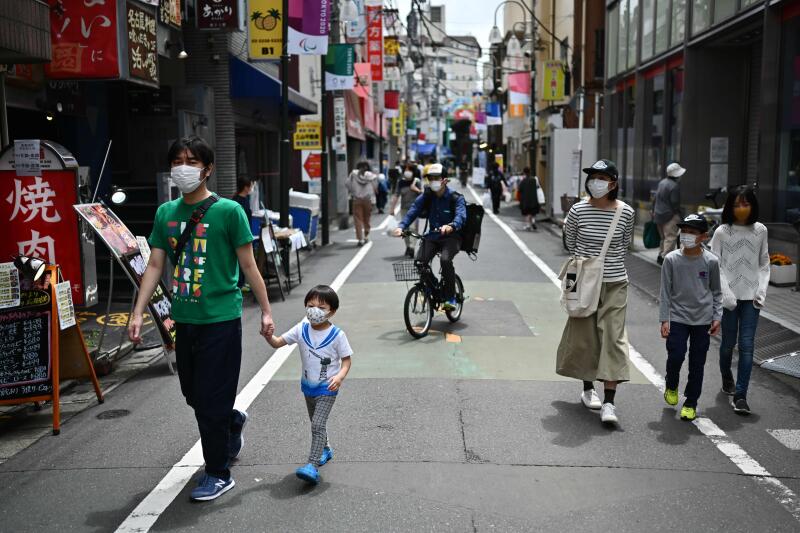Coronavirus: Japan extends state of emergency to end of May
Sign up now: Get insights on Asia's fast-moving developments

People walk past shops in Tokyo on May 4, 2020.
PHOTO: AFP
Walter Sim Japan Correspondent In Tokyo, Walter Sim
Follow topic:
Japan's state of emergency decree over the coronavirus, which was set to expire tomorrow, will be extended until May 31, Prime Minister Shinzo Abe said yesterday.
He urged the public to get used to a "new lifestyle" in the Covid-19 age that will continue even after the imminent threat eases, as the government starts laying its groundwork for an exit strategy.
A partial lifting of the emergency declaration may be possible as soon as Thursday next week, Mr Abe said, when an expert panel will meet to review the situation.
He noted that the number of daily infections nationwide has fallen from the peak of more than 700 to about 200 a day.
While this showed that Japan was on the road to putting a lid on the situation, it was still not satisfactory enough to justify a total lifting of the state of emergency.
Japan had 15,253 cases as at 7pm yesterday, an increase of 176 from Sunday, with 555 deaths, up by 19.
Mr Abe apologised for the "heart-wrenching" decision to continue emergency measures, noting the hardships of small businesses and promising prompt cash handouts of 2 million yen (S$26,500) each to help ride out this period.
"Prevention of the spread of infections is necessary to save lives, and until there are effective treatment methods or vaccines, we must brace ourselves for a relatively long battle," he said. "But if the severe restrictions on economic and social activities are to continue, life cannot be maintained. We must thus, as soon as possible, create a new normal for the coronavirus era."
Guidelines drawn up by an expert panel yesterday called on the public to practise social distancing and keep 2m away from one another, and wear a mask outdoors.
These guidelines, Mr Abe said, must be followed even after malls and restaurants reopen later. Parks, museums and libraries are the first to be allowed to reopen, with anti-virus measures.
The state of emergency was first declared on April 7 in Tokyo, Chiba, Kanagawa, Saitama, Osaka, Hyogo and Fukuoka, before being expanded on April 16 to cover the entire country.
The coronavirus has forced a sea change in Japan which is, among other things, looking at revamping its education calendar altogether to move the start of its school year to September from April.
And as businesses move online, they are starting to eschew fax machines and the traditional seal that is required on documents.
The new guidelines also urge businesses to continue teleworking or stagger commuting hours, and to hold meetings online.
Economy Minister Yasutoshi Nishimura, Japan's point man for its Covid-19 strategy, told Parliament any decision to lift the emergency declaration will require looking at such factors as the number of new cases, the situation in neighbouring prefectures and the strain on the healthcare system.
Due to constitutional guarantees of freedom, Japan's state of emergency, which carries no penalties, has been much less restrictive than in many other countries. But many Japanese have complied with the "strong requests" for the public to stay home and for businesses to shut.

